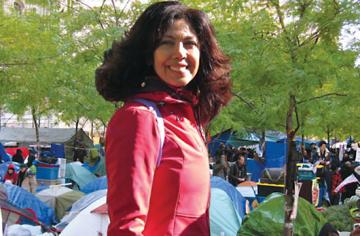Bringing community values into our economic life
- Dr. Ana Maria Peredo

The ‘Occupy’ movement seems to be losing its place in the public eye as it is removed from city squares and public spaces. But the initial response suggested they were onto something that we had better not lose.
I happened to be in New York at the beginning of November, and I spent a bit of time visiting Liberty Square where the main encampment was. There was lots of bustle and conversation, and signs up everywhere advertising people’s concerns.
It’s been said that the movement didn’t have a point, and lacked focus on a single issue. It’s true I saw signs with a huge range of issues. But I think it is right to say that there was a strand running through the protests: there is something wrong at the heart of our economic system. It has to do with obsessions about profitmaking, and the fallout in terms of gross inequality and crumbling social arrangements.
It all resonated with a keynote I was in New York to give at a conference on social enterprise held at NYU. I was arguing in my talk that our business and commercial life has become increasingly “disembedded” from our ideals of community and concern, expecting markets driven by the profit motive will look after the goods we need to make societies work. We have been learning that doesn’t work. Social enterprise, I was suggesting, can be one attempt to bring community ideals back into the centre of the picture.
The people in Liberty Square were saying it better than I could. They seemed to be calling out, in lots of different ways, for a kind of economic life that involves us as people-in-community and citizens, not just customers or consumers. Some were pointing to alternatives we already have. I talked with one group who were calling on people to move their bank accounts to credit unions, where “customers” are members, with democratic rights of governance where one person has one vote, not a number of votes depending on share capital.
I couldn’t help admiring the way that people were calling attention to different ways we have of carrying on our economic life, and a lot of it had to do with accessible, democratic ways that involve us as citizens as well as buyers and sellers. Credit unions and co-ops are one important alternative, but there are many others.
I stumbled into a meeting an Occupy group was having in a subway station, and the way they conducted their conversation was impressive. It was, in a way, highly organized, with ways of indicating who was speaking and maintaining respect for what was said. But it seemed almost anything could be said, and given a hearing. There was lots of disagreement, but there was a basic civility about it all. Working arrangements were agreed on and progress was made.
I couldn’t help wondering what it would be like if our academic bodies, let alone provincial and federal legislatures, operated in something like this way!
A couple of years ago, early in the economic crisis, we at the Centre for Co-operative & Community-Based Economy had a public forum called “Remaking the Economy Through People’s Eyes.” It had a great response from many sectors of Victoria and beyond. In talks and workshops, many different ways of organizing our economic life were discussed and explored. I think we were connecting with something the Occupy movement later tapped into at a very deep level across many societies: the feeling that we need to make our economic life different, not just productive, but connected to values of well-being in our communities. If we don’t stay plugged into that, we will be missing something big and basic.
Dr. Ana Maria Peredo is director of the Centre for Co-operative & Community-Based Economy
Views expressed in this article are the author’s and do not necessarily reflect those of The Ring or the University of Victoria.
Photos
In this story
People: Ana Maria Peredo

